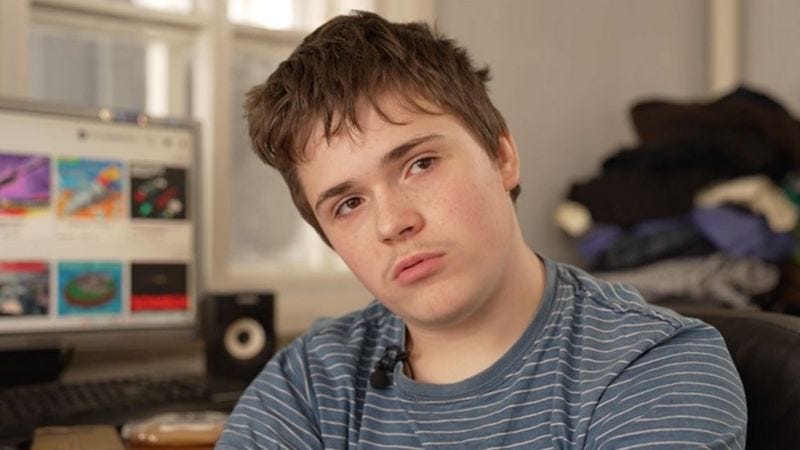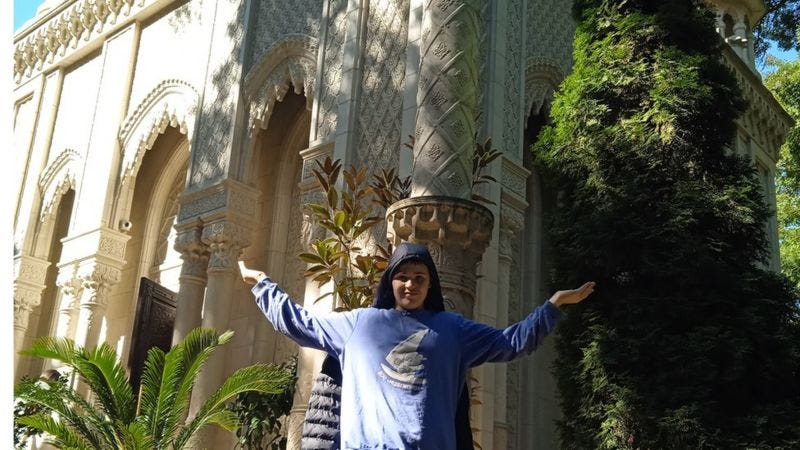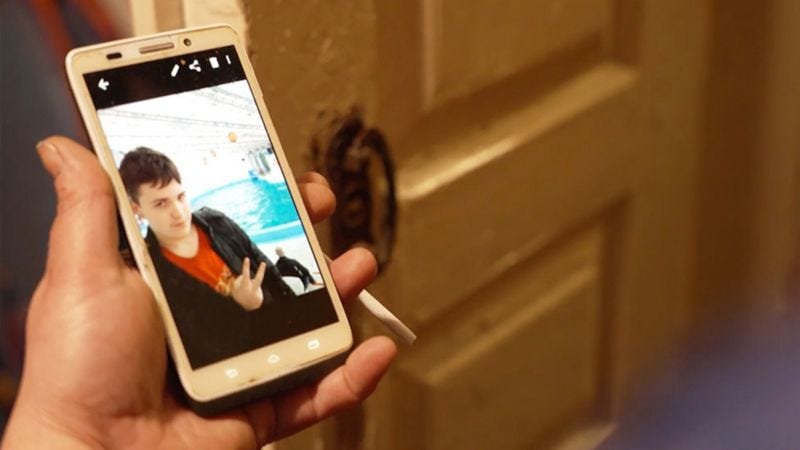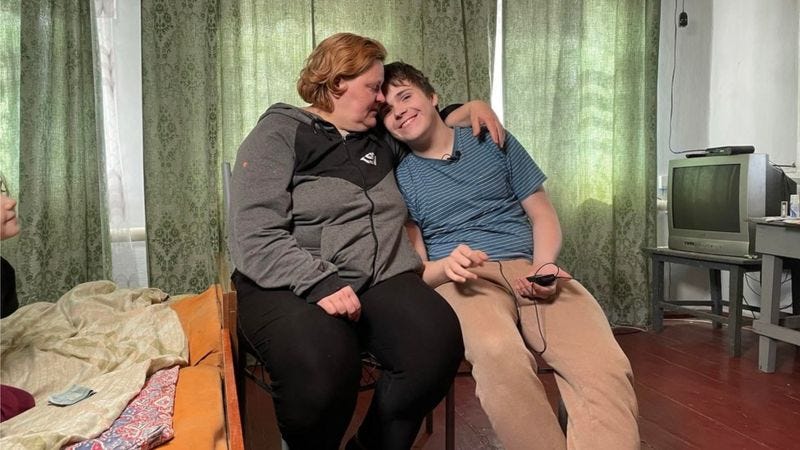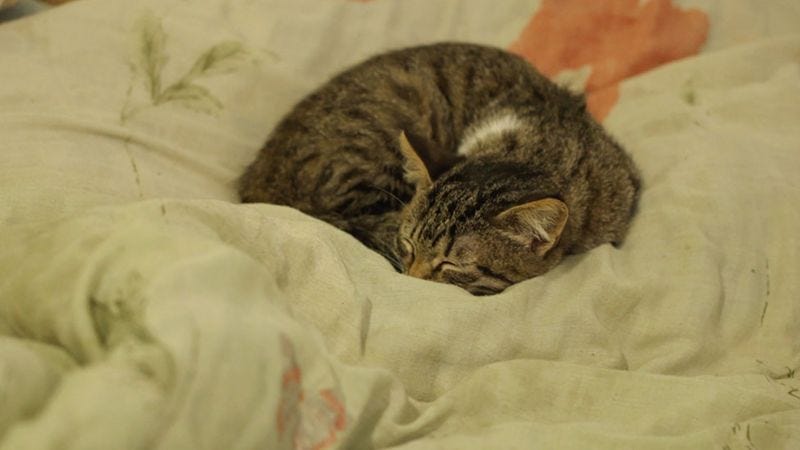LONG READ. Trapped in Russia: How a three-week summer holiday turned into a seven-month nightmare for one Ukrainian schoolboy
Teenager Bogdan Usik from Russian-occupied Balakliya was offered the chance to spend a few weeks away from the war in a Russian holiday camp. Then he was told he couldn't go home. Here is his story.
By Svyatoslav Khomenko and Nina Nazarova.

When Russian troops occupied the Ukrainian town of Balakliya last year, local children were offered the chance to spend a few weeks away from the fighting at a Russian seaside holiday camp. One of those who made the journey, was 13-year old Bogdan Usik. Halfway through their holiday, Ukrainian troops retook Balakliya, and the children found themselves stuck in Russia with no way to return to Ukraine. For the next seven months, Bogdan was moved from camp to camp, fearing he would be sent to a children’s home, as his mother Olga battled to find a way to bring him home.
Olga Usik clearly remembers the day she made what she now calls the biggest mistake of her life.
It was 27 August 2022 and she was on her scooter, with her four-year old daughter, Nastya, riding behind a bus heading out of town. On the bus was her older son, Bogdan, one day short of his fourteenth birthday. Olga had just dropped him off at the start of a three-week seaside holiday in Russia’s Krasnodar region.
Balaklyia is a frontline town in Kharkiv region. In August 2022 it was occupied by invading Russian troops. Shelling began at 5am every day, “reliable as an alarm clock’, Olga says. The family home had cracks in the walls, from the shelling, and one window had been bricked up to improvise a bomb shelter.
Olga describes her son as a gentle and sensitive boy, a homebody who spent much of his day in front of his computer. Olga had convinced herself that he’d be better off by the sea than at home.
But as she followed behind the bus, all Olga wanted to do was to step on the gas, cut in front and – at the risk of looking crazy, retrieve Bodgan and take him home. But instead she forced herself to turn the scooter round, and drive home.
Although she didn’t know it then, Olga and Bogdan wouldn’t see each other again until the following spring.
For Bogdan what was supposed to be a three-week break in the holiday resort of Gelendzhik, turned into a seven-month odyssey through a series of children’s camps in Krasnodar region amid growing fears he would be sent to a children’s home or given up for adoption.
And for Olga it was the beginning of a long nightmare which would see her battling with Ukrainian and Russian officialdom and even seeking help from a Moscow official later indicted by the International Criminal Court accused of facilitating child abduction.
Over the next seven months there were many times when Olga would regret her decision to stop following that bus and head for home.
No work, no food and not enough humanitarian aid
For the Usik family, and for everyone in Balakliya, war came suddenly on 24 February, and events unfolded at an unbelievable speed.
Olga was supposed to have a job interview that day, but it was cancelled. At 3pm she left home and went into town to collect a parcel from her mother.
Balakliya was deserted.
“There were no buses, nothing at all,” she remembers. And then suddenly out of nowhere a warplane roared overhead.
“All I had time to think was that if I don’t get down, I’m going to lose my head. I lie down, I listen – there’s glass shattering, glass all over my hands. The plane turns and flies away. And aeroplanes always fly in pairs, I know there’ll be another. I ran and crawled behind some piping, waiting for the second strike.”
Olga pulled shards of glass from her bloodied hands and called her husband, Sergei, who was at home with the children. He told her that the airstrike had blown out a window in the house. The frame had hit Sergei in the back, but the children were unharmed. They were all sheltering in the basement.
Later Sergei sealed up the window and for the next few days that room became the family’s bomb shelter.
The battle for Balaklyia didn’t last long. It was clear that the Ukrainian Defence Force had taken the decision not to defend the town, and instead to concentrate their efforts on Kharkiv, Ukraine’s second largest city, to ensure it didn’t fall into Russian hands. By 4 March, the Ukrainian General Staff acknowledged that Russian troops had taken Balaklyia.
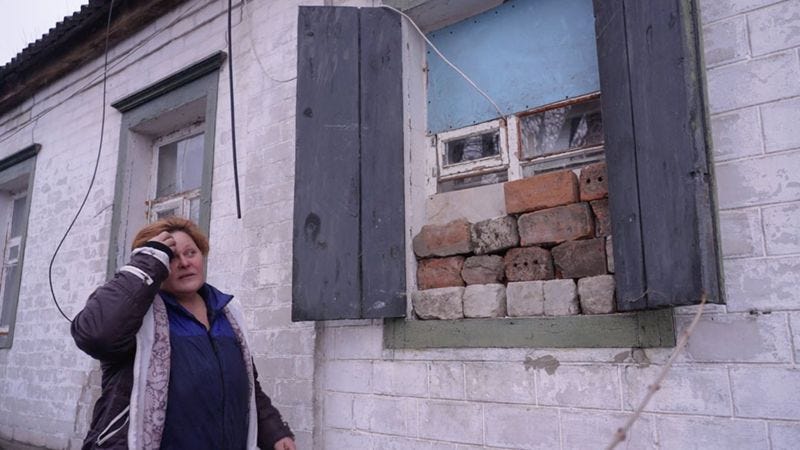
Olga says she is still angry with the Ukrainian authorities for not making efforts to at least enable Balakliya’s children to leave the town. There was no official evacuation programme, she says. Instead there were “volunteers” offering to take people to safety in Ukrainian-controlled territory. They charged 200 dollars per person and by the summer the price had tripled.
Olga remembers life under occupation with a heavy sigh.
“We had no money, no work. We lived on potatoes grown in the garden under shellfire. There was aid, but not enough to feed a family. You know what the Russian administration said to us? “We aren’t giving you aid to fill you up – only to stop you dying.”
After the first airstrike, Olga’s husband was afraid to go out onto the street, unless it was absolutely necessary. Olga herself made quick trips around the city through sheer desperation – they lived close to her disabled mother-in-law, who depended on them to bring her food.
Olga also used her scooter to deliver Russian humanitarian aid to old people on three neighbouring streets. On one of her trips, she noticed something was happening near the shopping centre on Balaklyia’s central square.
“I rode up and asked people what was going on. They said, go for it, take what you need. I take a look – and I see people carrying stuff out of the shops in wheelbarrows, in cars…I didn’t even want to go in, to be honest, it wasn’t how my parents brought me up.”
“You should have seen what happened round here with shops, flats, and houses – it was scary,” she says.
Olga was stopped by Russian soldiers on the street several times. They asked if she knew where to find the “atoshniki” [members of the ATO, the Ukrainian forces operating in the Donbas from 2014 to 2022 – BBC.]
“I asked them, do I look like someone who would know that?” After that, she always brought Nastya with her when moving around town. For one thing, the little girl was scared to stay at home, and for another, she was talkative, diffusing the atmosphere when they ran into armed troops.
Olga’s children reacted to the sounds of war in different ways. Four year-old Nastya would fall into a deep sleep after the first few explosions. The shelling was harder on 13-year old Bogdan – he couldn’t settle in one place, he would start running backwards and forwards, holding his head in his hands. He had trouble sleeping.
“He became very nervous. He was completely worn out,” Olga remembers. “He practically stopped eating.”
It was because of this that Olga started to pay attention when the first announcements were made that summer that the Russians were offering parents the chance to send their children to the Black Sea “for recuperation”.
The final straw for Bogdan
The first party of children from Balaklyia went to the Black Sea in July. The children left – and they came back happy, Olga recalls. New billboards promised three-week holidays in the “Little Bear” children’s camp near Gelendzhik. Olga had been to the area as a child and remembered it was a lovely place.
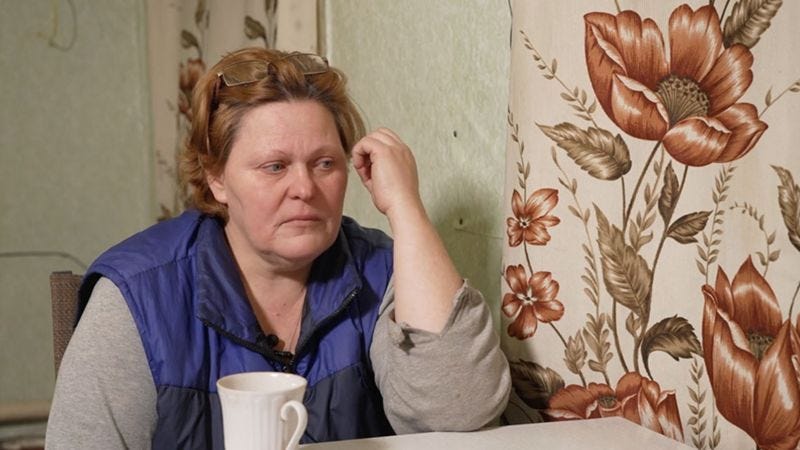
When a missile struck a house in the next street – Russian mortars periodically lined up outside to fire towards the Ukrainian positions before withdrawing – Olga’s mind was made up.
“We heard that strike very clearly,” she says. “The whole house shook. I said to Bogdan, do you want to go? He says: yes mum, I will. I can’t do this anymore.”
Olga went to the city administration and filled in a form, bringing a medical certificate.
Departure was set for 27 August.
Ukrainian parents who sent their children to Russian holiday camps are often asked – “What possessed you to send your child to Russia, the country that attacked your country, kills your compatriots every day, and denies Ukraine’s right to exist?”
“Honestly, anyone who says that to me can shut up,” says Olga, furiously. “You weren’t here, you didn’t see what it was like. I decided that Bogdan would be better off. I was saving him – I wasn’t handing him over to the Russians, I was sending him to a sanatorium, for treatment!”
One factor that clearly influenced her decision was that Olga was actually born in Russia and spent her childhood in Novozybkov, in Bryansk region. Her family moved to Balaklyia after the Chernobyl disaster in 1986. She still has relatives in Russia..
The demand for places on the holiday camp trips far exceeded the available slots. “You should have seen the way people would swear if their kid wasn’t given a place. You just can’t imagine.”
By the time his departure day arrived, both Bogdan and his mum were feeling very nervous. He had never been away from his family before.
“I said goodbye to him, hopped on the scooter with Nastya, and spent ages following the bus. All the time I was thinking, when will I see you again? I kept trying to banish the thought that maybe I’d made the wrong decision,” Olga remembers.
As the bus left Balaklyia, the children were startled by a deafening roar. Russian Grad rocket launchers positioned in a nearby field, started firing towards Ukrainian lines. Bogdan would later remember this as one of the strangest moments of his life.
Olga heard the Grads too, and told herself that it was a good thing that her son was escaping the horrors of war.
Rest cure
By the evening of their first day on the road, Bogdan and nearly 300 other children found themselves in Kupyansk, a border town in Kharkiv region, occupied at that time by Russian troops. The young travellers were given PCR tests and a hot meal, and there they spent the night. Then they were packed into larger buses – “little ones at the front, big ones at the back” and the convoy headed for Krasnodar.
Bogdan turned 14 during the journey. He told the boy he was sitting next to, and the whole bus ended up celebrating.
“They didn’t just let it pass,” he remembers. “Everyone wished me happy birthday.”
After three days, the buses finally arrived at the “Little Bear” Camp. Bogdan’s most vivid memories of his time in Russia are from this part of the trip.
“We had the sea. There were excursions – too many of them sometimes, as soon as we’d got somewhere and started to relax we’d be off again, somewhere else. They took us to an enormous zoo. They were into quest-style games, they were always organising them.”
The children kept in touch with their parents via the camp leaders, who gave them Russian sim-cards with Wi-Fi access. Most of them called home via the Viber messaging app. The camp leaders stressed the positives – the children were well-fed, they were getting five healthy meals a day.
Bogdan wasn’t over-impressed with the catering.
“Only the pelmeni were really nice,” he says. “The rest was just normal food – soup and bread.”
Liberation and loss
A week to the day after Bogdan’s departure, Olga went into town and was witness to a strange scene. Bodyguards for the town’s Russian-installed ‘mayor’, Yuri Shevchenko, nicknamed ‘the cockroach’ by the locals, were all jumping into cars and driving away at high speed.
“I called my friend, who is a hospital plumber, and he says: you know the Russian troops are kaput? I said, what do you mean? I mean exactly that, he said.”
Olga says that the Ukrainian counter-offensive didn’t come as a surprise to the people of Balaklyia – the locals had suspected that Ukraine was about to kick the Russians out for some time. Yet nobody had thought it would happen so rapidly. “We waited six months [for liberation] so I really didn’t think it would make a difference if my son went away to camp for 20 days,” Olga says.
In the three days between the Russian retreat and the return of Ukrainian troops, the town was heavily bombed. The ammunition was unusual: hundreds of anti-personnel mines, known as “petals” fell on civilian areas.
It looked like the Russian troops were trying to stall the rapid advance of the Ukrainian Armed Forces from the west.
On 8 September the Ukrainian army entered Balakliya.
“Suddenly everything went quiet, really quiet,” Olga remembers. “And after four or five days there were already a lot of Ukrainian soldiers here. They came door-to-door, making checks – mopping up, as they said. And then they regrouped and left, except for the ones who stayed to man the checkpoints.” Olga recalls.
“The war moved east, Balaklyia returned to Ukrainian control. And it was then I understood that I’d basically lost Bogdan.”
Separation
Bogdan says the children were never formally told that most of Kharkiv region had been liberated by Ukrainian troops, and they wouldn’t be able to travel home as planned.
Instead they found out when one of the group phoned home. Suddenly everyone was talking about it and realising what it meant.
“If the Ukrainians were there now [in Balakliya] then the Russians couldn’t bring us back, somebody might kill them on the way,” Bogdan explains.
“I was upset. Many of the older kids were angry, it’s understandable.”
The situation was made worse by the fact that the fighting for Kharkiv had cut off all communications. For two weeks, Bogdan had no idea what was happening to his family.
Bogdan and his group were not alone.
That summer more than 2500 Ukrainian children found themselves stranded in holiday camps in Russia’s Krasnodar Krai and annexed Crimea. At first it was children from Kharkiv region, but after the second successful Ukrainian counteroffensive, children from Kherson and Zaporizhzhia found themselves in the same situation. The exact number was not clear and was only officially acknowledged by Russia’s Children’s Rights Commissioner, Maria Belova Lvova in the spring of 2023.
When electricity and phone signals were finally restored to liberated Balaklyia, it turned out that the local teacher accompanying the children had changed her Ukrainian contact number to a Russian one, but hadn’t told the parents. With difficulty, Olga tracked down the number of the camp administration and eventually managed to speak to her son.
“The first thing I asked him was, how are you feeling? Excellent, he says. I said, they haven’t given you any injections have they? No, mama, what makes you say that? Well, you never know, I tell him. Broken arms, legs, is your head okay? Mum, everything’s fine. Well, what’s it like? Mum, the sea’s beautiful, you always promised me the sea. He says he’s alright for clothes, they’ve bought them new trainers and tracksuits for the autumn.” Olga recalls her first conversation with her son.
“I saw he’d got very thin. At home things were better, although we didn’t have much to eat. It was probably nerves,” she adds.
Mother and son didn’t talk much about what would happen next. “I just said I’d find a way to come and get him, so he wouldn’t get upset,” Olga said.
‘I just want to go home’
School classes were soon organised for the children at “Little Bear.” Bogdan remembers that there wasn’t much homework, and his favourite class was sport.
Hearing that her son had been enrolled in a Russian school, Olga called the “Little Bear” administrators, with a demand. She asked for her son to be excused from Russian history, and any class where the “special military operation” was discussed.
“The children understand the whole situation. Ukrainian children don’t need politics and propaganda. Plus, they can answer back – they have the right to do so,” Olga explains.
Olga’s worries were not unfounded.
In 2022 a study by researchers at Yale University in the US, highlighted the way Ukrainian children were being subjected to what they called ‘Russification’ in Russian summer camps. They documented around 6000 cases, including children testifying about being forced to sing hymns praising Russia, insulted and even beaten. A 16-year old held at “Dream” camp, Yevpatoria, told journalists that the security chief there would humiliate children and hit them with an iron rod if they said anything in support of Ukraine.
However, Bogdan says that in his case, his mum needn’t have worried. He was only ever taught world history. In music class there was some kind of song with the word “Russia,” but there was no requirement to memorise the lyrics, and the teenager mostly slept his way through the lesson.
“Even if someone said, “Glory to Ukraine!” nobody acted as though you’d said a forbidden word and would get the ruler [a beating.] A lot of us would talk about Ukraine, but the teacher didn’t react. Ukrainians – and Ukrainians, what can I say?” Bogdan remembers.
At the end of September, the governor of Krasnodar Krai, Veniamin Kondratyev, came to visit the children.
“He asked us all to make wishes. We arranged a party, we danced for him. You know, we were supposed to show how much we loved him,” Bogdan remembers.
After the governor made a speech, the children were given phones – pink and red for girls, grey, green and black for boys. Then each child received a blank piece of paper, on which to write a wish.
Bogdan remembers several children asking the governor for financial help and he immediately gave them 5000 roubles each in cash.
“I didn’t ask for support,” he says. “I just wrote that I wanted to go home.”
No money, no trip
The camp administrators said they couldn’t take the children back to Kharkiv region, but they were ready to hand them over if their parents could come to collect them in Krasnodar Krai.
But there were conditions.
“Children at the camp are free to go, but only with their parents. No grandmas and grandpas, no relatives, no proxies, only parents,” the mother of one of the children stuck in “Little Bear” told the BBC in October 2022.
And the journey was not one that everyone could make.
It’s about 800 kilometres from Balaklyia to Gelendzhik, but the Ukraine-Russia border is closed, and martial law means Ukrainian men can’t leave the country. The only option was for the children’s mothers to make a long and costly trip – across the whole of Ukraine, through Belarus, Latvia and Lithuania, and down into southern Russia.
Some of the mothers the BBC spoke to made this journey. Bogdan remembers envying the children who were taken home. One mother told the BBC that when she arrived at the camp, representatives of the Krasnodar Krai administration said she could resettled in Russia if she wanted to. Some mums took up the offer, and moved with their children into temporary accommodation in the city of Yeysk. Others took their children and made the long journey back through Europe to Ukraine.
But for many families, the Usiks included, the cost of the journey– around 800 dollars – was way too high.
Olga didn’t have that kind of money. Work was hard to come by in Balaklyia, and her husband, Sergei, had gone to work as an electrician on a construction site in western Ukraine.
Friends gave her phone numbers for volunteer groups, who might be able to help. But she got nowhere..
The Ukrainian law enforcement authorities have opened a case over the illegal detention of children abroad. The removal of Ukrainian children by the occupying Russian authorities is considered forced deportation, even if it happened on a conditional voluntary basis, as in Balakliya.
In January, Olga was invited to the prosecutor's office to give a witness statement, but the state offered her no assistance to get her son back.
As the months went by, Olga and Bogdan spoke on the phone every day.
"I would say, son, there’s no money, I can’t come and get you yet,” Olga says. “He would say, 'Yes, mum. I'll wait. I’ll wait as long as it takes."
“My boy, you’re growing up,” she remembers telling him, sadly.
Bogdan never rushed her, but would ask cautiously after every conversation: "Mum, is there any change?” “Not yet son,” she’d tell him. “We’re raising the money. Don’t worry.”
Bogdan said to her once: “Mum, I’m hoping for peace so badly, then I could just go home. That way they’d take me themselves – you wouldn’t have come all the way and you could just meet me at the border.”
Gelendzhik – Anapa – Yeysk
As summer turned to autumn it became clear that the children would need somewhere more suitable to stay for the winter months.
In early October, they were taken to “Vita” camp in Anapa. Bogdan liked it there – the children weren’t just handed ready prepared meals, but got to choose dishes for themselves. Plus, he recalls, the sanatorium was “more expensive-looking." But the children heard the leaders openly remarking that they’d soon have to be transferred somewhere else, for financial reasons.
This was what happened. At the very end of 2022, the children were taken to the temporary accommodation point, in a sanatorium built for families in Yeysk. The children missed the delicious salads and cakes they’d got used to in “Vita,” but on the other hand, they were finally living apart from the camp counsellors and taking specially designed courses in a Yeysk school. And most importantly, they got to keep their phones.
In Yeysk, the Ukrainians crossed paths with their Russian peers for the first time.
“A few kids pointed at us in the playground and went, hey, Ukrainians, and laughed. But we didn’t react and they soon stopped. Especially when they found out we had kids who were older than them. We had Sasha, a serious dude, he could have beaten them up, easy,” Bogdan explains.
The confrontation never came. The teenager says that some of the teachers and students supported the Ukrainian children. “They said, don’t be scared, you’re not going to be troubled here.”
Bogdan remembers growing more homesick with every passing day. The competitions, quests, and expeditions petered out. After class, Bogdan lay on his bed playing video games and watching clips.
“I lay there thinking, what am I doing here? Why did I come here? Sometimes I’d wake and wonder, who am I?”
One day he remembers feeling so sad that he couldn’t bring himself to get out of bed. He spent the whole day there, missing home. The next morning felt easier.
Things weren’t simple for Olga either. Local residents who had managed to escape to Kyiv controlled territory for the duration of the occupation, were openly hostile to parents who had sent their children to Russia, calling them ‘separatists”.
“But I was prepared to live with it – I will live with it,” Olga says.
Worst of all, the gas was turned off in the Usik house after they couldn’t pay the bill. It was cold and uncomfortable in the house, with the window still boarded-up from the previous winter and the walls cracked from shelling. Olga decided to keep saving her money and to aim to collect her son in the spring, when it was warmer.
Olga’s journey
Some time after New Year, the children in Yeysk heard a rumour that those who still hadn’t been collected by their parents by the end of February would be put in a children’s home.
Bogdan told his mother the news at once. “I thought, that’s it, our song is sung.”
Olga was shocked. The administrators claimed that children with parents would not be given up, and that the children had “misunderstood.” But Olga then heard a story about four orphans from Kharkiv who were sent from Yeysk to live with a Chechen family.
She decided it was time to make the journey.
They’d managed to save some of the money over the last few months, and her husband’s boss gave them an advance to cover the rest.
Early one morning, she travelled by shared taxi to Kharkiv . The next stage of her journey would be a three-day minibus ride across Ukraine, and through four European countries before finally getting to Moscow, from where she had booked a ticket to take her to Krasnodar.
“Everything was calculated, Olga says, “But what I wasn’t expecting was that they wouldn’t let me cross the Russian border.”
Like many other Ukrainians from Kharkiv, the Usiks had travelled regularly to Russia for work before the war. Back in the ‘90s, Olga and her mother had gone there as “shuttle-traders,” and Olga had then made a solo trip. “I spent two years as the best bartender in Valuiki,” she says, not without pride.
Back in 2014 Olga’s husband Sergei had been offered a job in the Russian town of Belgorod. The family moved there and Nastya was born there in 2017. Olga had struggled with post-natal depression after a difficult birth, and as a result she forgot to renew their residence papers. In 2018 the migration service discovered this and the family were deported and banned them from entering Russia for five years. Back in Ukraine, they found a Russian lawyer who agreed to work long-distance. He soon informed them their problem was solved, the entry ban had been lifted.
“Whether he was lying to us or mistaken, I don’t know,” Olga reflects. “We’re not in touch.”
At four in the morning on 26 January, the Kharkiv minibus arrived at the Estonia-Russia border. One by one, the passengers were questioned by the FSB.
“They asked, how do you feel about Russian troops?” Olga says, recalling the “interview.” One woman said, “Are you mad? I’m from Soledar.” So what, they replied, and she asked if perhaps they’d like to go and see for themselves.” [Soledar was badly damaged in the Russian invasion – BBC.]
Olga was also asked how she felt about the Russian invasion of Ukraine.
“I’m not going to say anything, I’m here for my son. My son is in your camp, I need to get him,” she told them.
“Where are the Ukrainian troops positioned?”
“I don’t know, I haven’t seen them. I have a small child at home, I never go anywhere. I’m just here for the older one, that’s all.”
They asked whether she’d been pleased when the Russians occupied Balaklyia.
“Oh yes, I was jumping for joy so much that I knocked all the windows out,” she recalls ironically a reply that she would’ve given.
After the interrogation, an official told Olga that she wouldn’t be able to collect her son. It turned out that the travel ban enforced in 2018 was still in force – she couldn’t enter Russia until May 2023.
“I thought, I’m not going to survive this,” Olga remembers, with emotion. “I started screaming at him and crying. They’d ripped my heart out.” She returns to the conversation with the border guard. “I say, don’t you get it, my son’s here. I’m going to tear you apart, I don’t know what I’ll do, please just let me through. And I bargained, and I cried, and I swore and I fought. To what end? There’s some idiot in glasses standing in front of me, he says – it makes no difference to me, I’ve got my instructions. And I said: “May God grant you health and happiness so you have a child like mine, and then let them take him away. And then may there be some prick standing in your way trying to be clever.”
Stuck on the neutral strip between the Estonian and Russia border points, Olga “was in delirium.” “I wanted to run into the forest, cross [illegally] the border, anything I could think of.”
Olga called Bogdan from the border – he was waiting, following her route on a map, and had asked several times if she was nearly there yet.
“Bogdan was so upset,” Olga remembers. “He said, come on, mum, we’ll speak tomorrow; I told him not to cry too much, and he said – of course I won’t cry, I’m a man. I’ll find a way, I promised, you understand? Mum, I understand, I know. Let’s talk tomorrow.”
Bogdan is reluctant to recall that day. He says he lay on his bed after hearing the news from the border.
“I lay down for a bit and then I got up,” he says. Did he cry? No, answers Bogdan, restraining himself. “Of course I was sad, but not that much, there’d already been so much disappointment.”
Battles with bureaucracy
Returning to Ukraine, Olga tried to solve the problem from the other side. She wrote a personal appeal, describing her situation in detail, to the office of the Commissioner for Children's Rights in the Russian Federation Maria Lvova-Belova.
They were quick to call her and ask whether she really wanted to take her child. “I told them, of course!” Olga says.
The return process was organised by the Ukrainian charity SOS Children’s Villages Ukraine. According to director Daria Kasyanova, although the Russians did not as a rule allow children to be collected by proxies, they made an exception for Bogdan. Olga supplied a Ukrainian power of attorney, which was then legalised in Moscow. This was a first for the foundation. Kasyanova attributes the success to the fact that the child himself had already asked desperately to be sent home.
It took almost two months to find a chaperone – the stepmother of another Kharkiv boy stuck in Russia, and to complete all the paperwork. SOS Children’s Villages Ukraine also paid for the journey of the woman and both children. The organisation brought back 54 children from the camps (rescuing 85 Ukrainian children from Russia in total). Another charity, Save Ukraine, organised and funded the return of 95 Ukrainian children.
Whilst the documents were being processed, the International Criminal Court in the Hague issued an arrest warrant for Maria Lvova-Belova. She and Russian President Vladimir Putin are accused of illegally deporting Ukrainian children during the Russian invasion of Ukraine.
"They didn't recognise me!"
A week before the journey was scheduled, Bogdan was told that he was finally going home
“There was a lot of joy,” he says, remembering his last days in Russia.
They returned to Ukraine after a day in Minsk, taking time to visit the adventure playground in a shopping centre. They crossed the Ukrainian border into Volyn, only to find that Bogdan was already listed by the Interior Ministry as a kidnapped child. The guards called Olga: did she know that her son was being collected by this woman? This is how Olga found out that her son was back on Ukrainian territory.
In Kyiv, the other boy was asked to stay for questioning at the Ukrainian Prosecutor’s office, and the chaperone put Bogdan on the train to Balaklyia.
“I’m looking out of the window, Balaklyia already! I’m waiting in line, I jump out – then I see my mum and grandma! But they don’t recognise me! I leapt over the steps, overtaking several people, it was fun. And only then did my mother recognise me. Because imagine, some man just runs up and hugs you,” he remembers.
Olga fights back the tears as she remembers the reunion. “He climbs out of the train, this funny, skinny thing. Not quite a boy and not quite a grown up. We cry a bit, and then we take him and bring him home.”
A few days after Bogdan’s return, the Usiks moved house: a friend who decided to leave town offered them his home for a small fee. Their new home has more light and space, and a window that isn’t boarded up. First, Bogdan has to meet Belka the cat, who was born after he left for the camp. He visits his grandma to give her the presents he bought at the coast. He helps his father around the new house – he’s taller than Sergei now, after six months away. Sergei only came to Balaklyia for a few days to see his son, before returning to work.
When the BBC meets Bogdan and Olga, he has only been home for four days. He still hasn’t had the chance to look around the town, which bears heavy scars from the bombardment, and is slowly being rebuilt. When we ask him what the main difference is between the town now, and when he left, and he responds without hesitiation: “It’s so quiet.”
The silence of Balaklyia is broken occasionally by explosions – the town is still being swept for mines. In central Balaklyia, the “petals” that fell last September still reappear. Olga has had to keep reminding her son – only walk on the paths.
“I still can’t let go. For the first few days, all I did was walk round, looking at him,” she says. “I’ll never let him go anywhere now, no camps of any kind. He’ll stay here till 11th grade and only go away to study when he’s almost grown up. And not somewhere far away.”
Bogdan laughs. “Exactly, I’ve been breathing fresh air all my life, no more camps. Even if they forced me I’d hide in some corner. Build a brick wall around myself.”
Many other reasons
On 14 April the Commissioner for Children's Rights in the Russian Federation, Maria Lvova-Belova, announced that all the children of Ukrainian citizens "who were vacationing in the Krasnodar Territory and postponed their return" had now been handed over to their relatives. Eight more children remained in annexed Crimea, she said.
“Russia has always promoted, and will continue to promote the idea that families should be together,” she said in a post on her Telegram channel.
In November 2022 Lvova-Belova announced that she had adopted an orphaned Ukrainian boy from Mariupol. The circumstances in which he was brought to Russia and joined her family remain unclear.
In March 2023, a report was released by the UN Commission of Inquiry, investigating wartime violations of international law, including the illegal movement of children.
The report included a separate section on the holiday camps, noting that although the children left with parental consent and eventually returned home, their extended stay in Russia can be considered a war crime in its own right.
"The Russian authorities have violated their obligation under international humanitarian law to make every attempt to facilitate the reunification of families separated as a result of armed conflict. Such behaviour may also amount to a war crime, in the form of unjustified delays to the repatriation of civilians."
Olga, sitting close to her son, finds it difficult to explain exactly why Bogdan’s return took so long.
“Some say the children were being used as political hostages, but I’m not convinced. If that was the case why did they let them go home in the end? Maybe it was because they’d spent so much money on them. Or perhaps the Russians thought they’d be back to Ukraine soon anyway.
“I wondered so many times what was taking them so long. They had so many chances to send the children back. Just drive to Belgorod and tell the parents to wait at the Russian border, we’ll transfer the children – and believe me, the parents could have gone to the border easily. But as you see, it became so hard to collect the children.”
On Russian state-controlled TV, reporters often claim that the reason the children, and in some cases their mothers, stayed for so long was that they didn’t want to go back to Ukraine, and given the chance they’d happily stay in Russia.
Olga was born in Russia, she’s a Russian-speaking Ukrainian citizen. The five months of the Russian occupation of Balaklyia, the ordeal with the Russian bureaucratic machine and her son’s prolonged “rest cure” have changed her feelings towards Russia.
“Before, I’d have told you – it’s all the same to me – Russia, Ukraine, as long as they don’t touch anything, as long as there’s calm. Now I want calm – and I want Ukraine,” she says. “No matter how badly Ukraine is screwed, I’d rather stick it out here. I don’t want the Russians here… …we don’t need them here. They don’t need us either, they just want our land.”
If the Russians tried to come back, Olga says she would fight them herself.
“Last time was the first time they’d walked in here. People were taken unawares. That won’t happen again. People will go after them with pitchforks. And that’s it. People get it now. We won’t stand for it again.”
Read the full story in Russian here.
Translated by Pippa Crawford.
English version edited by Jenny Norton.
LONG READ: Inside a war crime - the medics, mums and babies who survived the Mariupol hospital attack
By Olesya Gerasimenko. On 9 March 2022, Maternity Hospital No.3 in Mariupol was hit by a Russian airstrike. Photos of pregnant women covered in blood, staggering out of the wreckage shocked the world. One year on, Olesya Gerasimenko has spoken to some of the survivors - the women who gave birth by candlelight as the fighting for Mariupol raged around t…




